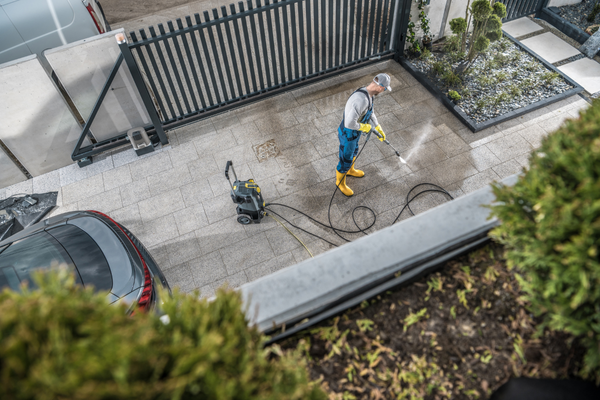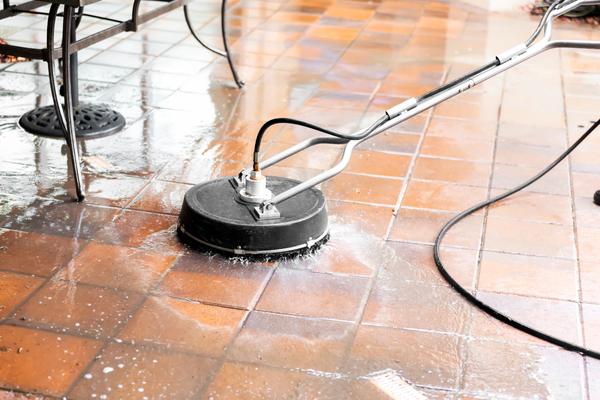There is a deep satisfaction a homeowner feels when they look at their property, clean and cared for. But then you see it. The nagging dirty driveway, the dark streaks on the roof, or that grimy patio that just ruins the whole picture. It makes you feel like the job is never done.
A pressure washer seems like the magic wand to fix it all. It is tempting to think you can blast away every problem. But using that same powerful force on every surface can lead to a real disaster. High pressure can carve lines into your concrete, send shingles flying off the roof, and leave your beautiful wooden deck permanently splintered and fuzzy. A one-size-fits-all approach is a recipe for expensive repairs.
This complete guide will give you a surface-by-surface plan for the correct, safe, and effective cleaning methods. We will cover the right way to clean everything from your concrete driveway to your roof and your favorite outdoor patio. Following these steps will get you a beautiful result without any of the costly damage.
Table of Contents

Concrete & Driveway Cleaning Guide
Why is Cleaning Concrete Surfaces a Critical Home Maintenance Task?
Cleaning concrete is vital for safety, longevity, and curb appeal. It removes dangerous slip hazards like algae and oil, prevents corrosive substances from causing long-term decay and cracking, and instantly boosts the visual value of a property. It is more than just cleaning; it’s about protecting your home’s foundation and walkways.
People often overlook their driveways, but keeping them clean has real benefits.
- Hazard Removal: In the shady spots of your yard, concrete can grow a thin, slimy layer of mold, grease, and algae. This becomes incredibly slippery when wet. Concrete cleaning gets rid of these dangerous patches.
- Damage Prevention: Bird droppings, oil drips, and even wet leaves can be acidic. Over time, they break down the surface of the concrete. Cleaning stops this damage before it starts.
- Enhanced Curb Appeal: A bright, clean driveway makes your whole house look better. It is one of the first things visitors see, and a clean one makes a great first impression.
- Stain Management: When you wash concrete regularly, you get rid of small oil spots and spills before they soak in deep and become a permanent, ugly stain.
What is the Professional Process for Pressure Washing a Driveway?
Knowing how to wash concrete the right way makes all the difference. It is a step-by-step process that professionals use to get perfect results every time without leaving stripes or marks.
- Preparation: The first step is to clear everything off the surface. Move cars, planters, and any furniture. Then, take a broom or leaf blower and get rid of all the loose leaves and dirt.
- Stain Pre-Treatment: For tough spots like oil stains, you need to pre-treat. Apply a concrete-safe degreaser or a special rust remover and let it sit for 10-15 minutes to do its work.
- Equipment Selection: A pressure washer with at least 2,500 PSI is needed for good cement cleaning. The most important tool for an even finish is a surface cleaner attachment. This tool glides over the concrete and prevents ugly stripes. A 25-degree nozzle is good for the edges.
- Washing Technique: Always start at the highest point of the driveway and work your way down. This lets the dirty water flow away from the clean areas. Move in a steady, overlapping pattern.
- Final Rinse: After the main wash, do a final rinse of the whole surface to wash away any leftover grime. It is also a good idea to rinse off any nearby walls or plants.
Should You Seal Your Driveway After Cleaning?
Yes. Sealing your driveway after cleaning is a very smart move. A quality sealer soaks into the tiny pores of the concrete and creates a protective barrier. This barrier stops water, oil, and other stains from soaking in. It makes the concrete last longer and makes future cleaning much easier. You should wait 24-48 hours after cleaning for the concrete to dry completely before you apply any sealer.

Roof & Gutter Exterior Cleaning
What is Soft Washing and Why is it the Only Safe Method for Roofs?
Soft washing is a cleaning technique using low pressure combined with specialized, biodegradable cleaning solutions. It is the only industry-approved method for asphalt shingles because it safely kills and removes algae, moss, and lichen without using damaging high pressure that can void warranties and cause leaks. It lets the cleaners do the hard work, not the force of the water.
High pressure is very dangerous for roofs for several reasons:
- It blasts off the small, protective granules on your shingles.
- It can lift or crack shingles, which lets water get underneath.
- It can force water deep into your roof deck, causing wood rot.
- It can even void your roof’s warranty.
How Do You Clean the Exterior of Gutters?
Those ugly black streaks on your gutters are not mold. They are caused by something called electrostatic bonding. Dirt, pollen, and pollution from the air stick to the metal finish like a magnet. The only way to clean them is with a special gutter cleaning solution that breaks this bond. A professional service like Carolina Power Washing will apply this cleaner, gently scrub with a soft brush, and then rinse it clean with low pressure.
Can You Pressure Wash the Inside of Gutters?
While you can use a pressure washer on a low setting to flush out leaves from inside a gutter, it is extremely messy. It can spray old, rotten leaf gunk all over your siding, windows, and landscaping. The safer and cleaner method for a homeowner is usually to remove the big clumps of debris by hand and then flush the gutters out with a regular garden hose.
Decks, Patios & Outdoor Living Cleaning
How Do You Safely Clean a Wood Deck or Fence?
Cleaning a wood deck requires a gentle touch. The key is to use low pressure (between 500-1200 PSI) and a wide fan nozzle. You should let a wood-safe cleaner, like one with an oxygenated bleach solution, do the heavy lifting of killing mold and algae. Then, you gently rinse it away. It is very important to always wash with the grain of the wood. This prevents splintering and shredding the wood fibers, which is called “furring.”
Here are common mistakes to avoid:
- Using way too much pressure.
- Using a zero-degree pinpoint nozzle, which will carve into the wood.
- Using harsh chlorine bleach, which damages the wood fibers.
- Holding the nozzle too close to the wood surface.
What is the Best Way to Clean Paver Patios and Walkways?
Cleaning a paver patio is a multi-step process. First, any weeds growing in the joints should be treated. Then, the pavers can be cleaned with a surface cleaner, just like a concrete driveway. After rinsing, there is one more crucial step: re-sanding the joints. The pressure washer blasts out the old sand, so you must add new polymeric sand. This special sand hardens and locks the pavers together, which keeps them from shifting and stops new weeds from growing.
Why is Sealing Important for Both Wood Decks and Paver Patios?
Sealing is a critical final step for protecting your outdoor living spaces.
- For Wood: After a deep cleaning, a wood deck’s pores are open and vulnerable. A good sealer protects the wood from moisture that causes rot and warping. It also contains UV inhibitors that act like sunscreen for your deck, preventing the sun from turning the wood gray and brittle. This single step preserves the wood’s natural color and structural integrity for years.
- For Pavers: A sealer does more than just protect pavers; it beautifies them. It enhances their natural colors, giving them a rich, vibrant look. It also creates a protective shield against stains from spilled drinks, food, and oil. Critically, it hardens the polymeric sand in the joints, locking the pavers together and preventing weeds from growing through.

Conclusion
Every exterior surface of your home, from the hard concrete of your driveway to the soft wood of your fence and the delicate shingles on your roof, needs its own unique cleaning approach. This is something the experts at Carolina Power Washing have learned over decades of experience serving the Rock Hill, SC community. Using the correct pressure, the right technique, and the proper cleaning solutions is the difference between a beautiful, fresh look and a costly repair bill.
What outdoor cleaning project is next on your to-do list?
Feeling overwhelmed by the details? For a perfect clean every time, contact the experts at Carolina Power Washing for a free quote. Our team can handle everything from professional exterior building cleaning to sparkling clean driveways and patios. Let us manage your full-service house washing needs and even take care of your seasonal gutter maintenance.

